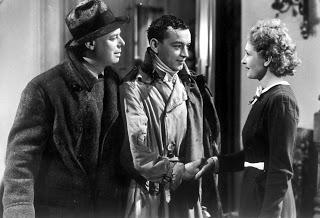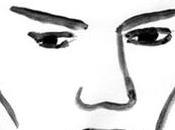 André è il giovane glorioso trasvolatore dell’Atlantico, un principe delle altezze, ha appena compiuto la sua impresa, a momenti atterrerà, e laggiù tutti lo amano. Lo stanno aspettando per rendergli il l’onore che merita. Ma poco dopo ai microfoni dichiara che quello è il giorno più triste della sua vita. A causa di un’assenza, ad aspettarlo insieme alla folla non c’è Christine, che è la sua musa, la forza gravitazionale che lo fa volare per poi riportarlo a terra, l’istigatrice delle sue sfide ai cieli. E se Macbeth uccide il sonno, questa Madame Macbeth uccide il sogno di André. O almeno lo ferisce, perché l’amico di André, Octave, musicista senza gloria, otterrà che malgrado tutto André sia invitato a quella partita di campagna che si terrà a casa del marchese De la Chesnaye, marito di Christine.
André è il giovane glorioso trasvolatore dell’Atlantico, un principe delle altezze, ha appena compiuto la sua impresa, a momenti atterrerà, e laggiù tutti lo amano. Lo stanno aspettando per rendergli il l’onore che merita. Ma poco dopo ai microfoni dichiara che quello è il giorno più triste della sua vita. A causa di un’assenza, ad aspettarlo insieme alla folla non c’è Christine, che è la sua musa, la forza gravitazionale che lo fa volare per poi riportarlo a terra, l’istigatrice delle sue sfide ai cieli. E se Macbeth uccide il sonno, questa Madame Macbeth uccide il sogno di André. O almeno lo ferisce, perché l’amico di André, Octave, musicista senza gloria, otterrà che malgrado tutto André sia invitato a quella partita di campagna che si terrà a casa del marchese De la Chesnaye, marito di Christine.Durante questa vacanza due saranno gli eventi clou. Il primo è una battuta di caccia, che inizia con gli invitati che sono così snelliti, arieggiati dal piano sequenza di Renoir, che sembrano immuni dalle responsabilità dello spazio, liberi da legami di luoghi, quasi trasportati con un passo che non lascia orme dal soffio delle parole che si scambiano: rapidi, incrocianti, autori di apparizioni balzi sparizioni: come lepri, scoiattoli, uccelli. Ma lepri scoiattoli e uccelli non sono inafferrabili, a poco a poco cadranno senza rumore uno dopo l’altro sotto i colpi dei fucili degli invitati in una serie di immagini anch’esse celeri e quasi immateriali, senza sottolineature plastiche, ma puntuali e senza scampo.
Solo una lepre riuscirà a guizzare fuori campo e solo uno scoiattolo tra i rami di un albero sarà risparmiato perché al posto del mirino del fucile sarà “inquadrato” dal binocolo di Christine. Come se il regista stesso fosse innamorato di lei e le cedesse la macchina da presa per un attimo come dono o come contropartita per i suoi occhi (al particolare dello scoiattolo seguirà il dettaglio degli occhi di Christine appena spogliati del binocolo). Del resto sono tutti invaghiti di Christine, non solo il pilota André. La ama il marito, che pure la tradisce (la vorrebbe la Favorita di un harem), la ama lo stesso Octave, anche se dice di amarla “in un modo diverso” (perché poi dovrebbe amarla “comunemente”?). Quasi quasi la ama anche la sua Lisette, la cameriera. E Christine ama il marito. Anzi no, ama un altro tra gli invitati. Anzi no, ama André. Anzi no, ama Octave. Christine non sa chi ama, è forse solo ebbra dei movimenti di macchina di Renoir, depistata dalle propagazioni visive da una regia pattinatrice, atletica, che fa le capriole tra il sottosuolo abitato dalla servitù e i piani alti assegnati al pilota e alle altre altezze o personalità con i trampoli.
La seconda sequenza cruciale è quella della festa in maschera, dove i personaggi ormai non avranno più resistenza d’urto nei loro viavai e come in un pavimento insaponato commetteranno e subiranno dei veri e propri autoscontri, delle voluttà di movimento che la m.d.p. di Renoir non pervertirà mai in puro convulso né sublimerà in balletto, irrogando piuttosto la sanzione di instabilità agli artefici di inganni e ambiguità, di facondia e virus peripatetico. La regola è il gioco. Ma alla fine troppo rumore per non esserci nulla, anzi troppo rumore perché possa mancare tra gli astanti il Nulla. Il nulla che si presenta nello spazio invaso che a un certo punto si spopola, torna incolume (mondo); la partita di caccia era troppo “lanciata”, tutto quel movimento non poteva arrestarsi così, casomai sospendersi, l’inerzia è un piano oltre la sequenza: ci scapperà il morto: un altro volatile, ma un volatile innamorato, André, sarà ucciso dal guardiacaccia che in realtà pensava fosse Octave tra le braccia di Lysette.
Il padrone di casa definirà l’episodio criminale un incidente. Uno degli invitati protesta o scherza “questa è la nuova concezione di incidente”, ma un altro invitato ribatte: “no no, il marchese è una persona di classe, e la classe è ormai una dote rara, molto rara”. L’ultima allusione di un conglomerato di rifrazioni e barbagli con la mira perfetta. Un’autoallusione. Bando alle regole di classe, le uniche regole che Renoir – uno dei rari- onora sono: le regole della classe.
Francesco Romeo | #spioncino
Class isn't water but everyone slips
The geometry of love in The Rules of the Game by J. Renoir
André is the young glorious crosser of the Atlantic, a prince of heights, he's just done his great achievement, he's about to land, and down there everyone loves him. They're waiting for him to give him the honor he deserves. But after a while at the microphone he declares that is the saddest day in his life. Because of an absence, waiting for him together with the rest of the crowd Christine is missing, she's his muse, the gravity force that makes him fly to bring him back to earth, the instigator of his challenge to the skies. And if Macbeth kills sleep, this Madame Macbeth kills André's dream. Or at least she manages to wound it, because André's friend, Octave, a gloriless musician, will obtain that André is invited to the country trip that will be held at the house of Marquis De la Chesnaye, Christine's husband.
During this trip two clou events will take place. The first is a hunting trip, which starts with the guests being so thinned and aired by the sequence plan of Renoir, that they seem immune of the responsibilities of space, freed of ties of places, almost transported with a step that doesn't leave prints from the whispering words they exchange: fast, crossed, authors of apparitions, jumps, vanishings: like hares, squirrels, birds. But hares, squirrels and birds aren't elusive, one by one they'll fall without a sound under the shots of the guests' shots in a series of images that are as fast and immaterial, without plastic underlinings, but punctual and without escape.
Only one hare will manage to run away and only one squirrel among the branches of a tree will be spared because instead of the gun it will be seen by Christine's field glasses. As if the director himself was in love with her, and gave her the camera for one moment as a gift or as a reward for her eyes (the particular of the squirrel is followed by the detail of Christine's eyes just discovered by the glasses). Anyway, they're all charmed by Christine, not just the pilot André. The husband loves her, even though he cheats on her (he'd like her the Favorite of a harem), Octave himself loves her, even though he says he loves her "differently" (why should he love her commonly?). Even her maid Lisette almost loves her. And Christine loves her husband. Or not, she loves another guest. No, she loves André. No, she loves Octave. Christine doesn't know who she loves, she's probably just drunk with Renoir's camera movements, confused by the visual propagations of an athletic direction, which jumps from the underground, inhabited by servants and the high stores given to the pilot, other highnesses and personalities on stilts.
The second crucial sequence is the one of the masquerade, where the characters don't have the same resistance in their movements, and as if on a soapy floor will do and suffer proper bumping into eachother, some movement voluptuousness that Renoir's camera doesn't pervert into pure convulsion nor will sublime in a ball, but rather gives the sanction of instability to the artificial deceits and ambiguities, of eloquence and peripathetic virus. The rule is the game. But in the end too much noise to not have anything, too much noise to allow Nothing to miss among the present. The Nothing that pervades the space invaded that at some point becomes deserted, goes back to being unharmed (world); the hunt was too "launched", all that movement couldn't just stop like that, just suspended, inertia is a plan beyond the sequence: there will be one dead: another bird, but a bird in love, André, will be killed by the keeper, who thought he was Octave in Lysette's arms.
The Marquis will define the criminal episode an accident. One of the guests protests or jokes "this is a new conception of incident", but another guest answers: "no, no, the marquis is a person of class, and class is now a rare, very rare gift". The last allusion of an agglomeration of refraction and reflections with a perfect aim. An autoillusion. Class rules are forbidden, the only rules Renoir - one of the few - honors are: the rules of the class.
Francesco Romeo | #spioncino







